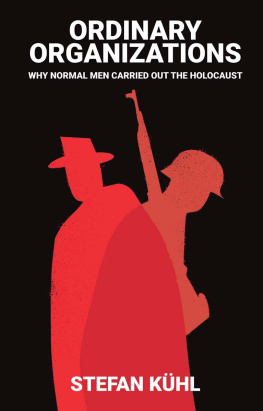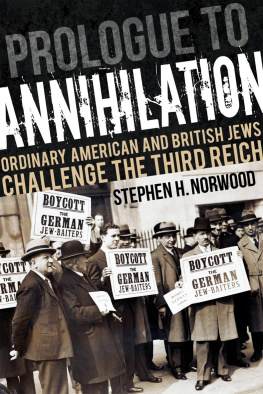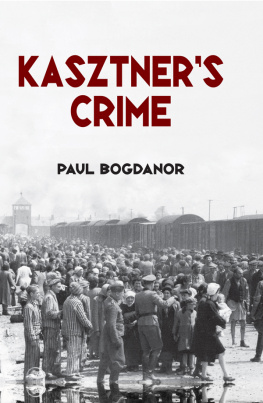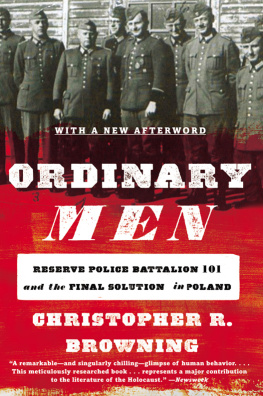Contents
Guide
Pages

Ordinary Organizations
Why Normal Men Carried Out the Holocaust
Stefan Khl
Translated by Jessica Spengler
polity
First published in German as Ganz normale Organisationen. Zur Soziologie des Holocaust, Suhrkamp Verlag, Berlin, 2014
This English edition Polity Press, 2016
The translation of this work was funded by Geisteswissenschaften International Translation Funding for Humanities and Social Sciences from Germany, a joint initiative of the Fritz Thyssen Foundation, the German Federal Foreign Office, the collecting society VG WORT and the Brsenverein des Deutschen Buchhandels (German Publishers & Booksellers Association).
Polity Press
65 Bridge Street
Cambridge CB2 1UR, UK
Polity Press
350 Main Street
Malden, MA 02148, USA
All rights reserved. Except for the quotation of short passages for the purpose of criticism and review, no part of this publication may be reproduced, stored in a retrieval system, or transmitted, in any form or by any means, electronic, mechanical, photocopying, recording or otherwise, without the prior permission of the publisher.
ISBN-13: 978-1-5095-0293-6
A catalogue record for this book is available from the British Library.
Library of Congress Cataloging-in-Publication Data
Names: Khl, Stefan, author.
Title: Ordinary organizations : why normal men carried out the Holocaust / Stefan Khl.
Other titles: Ganz normale Organisationen. English
Description: Cambridge, UK ; Malden, MA : Polity Press, [2016] | Includes bibliographical references and index. | Description based on print version
The publisher has used its best endeavours to ensure that the URLs for external websites referred to in this book are correct and active at the time of going to press. However, the publisher has no responsibility for the websites and can make no guarantee that a site will remain live or that the content is or will remain appropriate.
Every effort has been made to trace all copyright holders, but if any have been inadvertently overlooked the publisher will be pleased to include any necessary credits in any subsequent reprint or edition.
For further information on Polity, visit our website: politybooks.com
Introduction
In light of the horror of the Holocaust, it is easy to understand the desire for simple answers. It would be something of a relief to believe that the ghetto liquidations, mass shootings, and gassings in the extermination camps took place because the perpetrators had been seduced by Adolf Hitler, or because they belonged to a particularly brutal breed of people, or because they were all eliminationist antisemites and their hatred of Jews was so deeply rooted in their German culture that it was almost inevitable they would become Hitlers willing executioners.
This type of personalization assigns responsibility to just a few, while absolving the rest. Personalization means that people are identified on the basis of specific biological, medical, or cultural characteristics and branded as being pathological, criminal, or strange. The actions attributed to such people are thus personalized out of existence for anyone who believes these characteristics do not apply to them. According to this explanation which is reassuring at first glance it was fanatical Nazis, sick sadists, or particularly driven eliminationist antisemites who bore responsibility for the genocide. If you do not consider yourself a member of one of these groups, you can sit back and take comfort in the thought that you would have acted very differently.
But there are limits to the personalization of responsibility. There is no doubt that National Socialism was embraced by much of the German population, or that some people in the police forces and concentration camps saw their job as an opportunity to act on their deep-seated sadism, or that there were fervent antisemites in Germany who actively promoted the eradication of the Jewish population. What is surprising, though, is that many people who took part in the mass killings never displayed any such murderous behavior or inclinations either before or after World War II.
This book revolves around one of the most fiercely debated questions in Holocaust research: why ordinary men and, in many cases, ordinary women were willing to humiliate, torment, and murder hundreds, and sometimes thousands, of men, women, and children.
The challenge is to present an analysis that is informed by sociology but applicable to the wider discussion of the Holocaust. The explanations found in sociological systems theory in particular are often so abstract that other disciplines such as history, political science, philosophy, and psychology understandably no longer even bother with them, much less take inspiration from them. When sociologists attempt to explain the Holocaust by throwing around concepts such as binary encoding, autopoietic reproduction, or self-referential closure, they may distinguish themselves as ambitious theorists among a subsubgroup of fellow sociologists specializing in a particular theory, but scholars in other disciplines will, for good reason, simply ignore what they see as unnecessarily complicated approaches.
Readers can rest assured that this book not only refrains from presenting the fundamentals of systems theory in a way that might intimidate non-sociologists, it also illustrates its sociological reflections using a concrete example: Hamburg Reserve Police Battalion 101, the most thoroughly researched killing unit of the Nazi state. Precisely because it seems as though everything has already been said about this police battalion, and because the discussion of the battalion has been so contentious, the strengths of a sociological approach as a complement to, and often in contrast with, existing explanatory models in Holocaust research should become clear.
Beyond the controversy between ordinary men and ordinary Germans
Reserve Police Battalion 101 has attracted so much attention from researchers because its members were remarkably ordinary. Most of the policemen conscripted in Hamburg were family men who had held civilian jobs as dockhands, barbers, tradesmen, or sales-men before they were stationed in Poland as police reservists. Only a minority of the just over 500 battalion members had stood out as dedicated Nazis or SS men before their assignment in Poland.
The controversial debate surrounding this police battalion revolves around the specific sense in which these men were ordinary. To summarize the debate in a single question: were they ordinary men or ordinary Germans? Unsuspecting readers may be surprised by this opposition, because it seems obvious that, between 1933 and 1945, most if not all of the police in Hamburg were both men and Germans. But the emphasis on one word or the other is what makes all the difference in the debate.
Emphasizing the word men implies that, in principle, any male person would have been capable of killing Jews if they had found themselves in the same situation as the members of the police battalion. According to Christopher Browning in particular, a number of conditions had to be met for these ordinary men to become murderers: wartime brutalization, explicit racism, segmentation and routinization of the task, careerism especially among the leadership, obedience to orders, deference to authority, as well as ideological indoctrination, and conformity. Added to this was a distinct corps mentality, considerable peer pressure, and excessive drinking combined with progressive desensitization towards acts of violence in any form.











